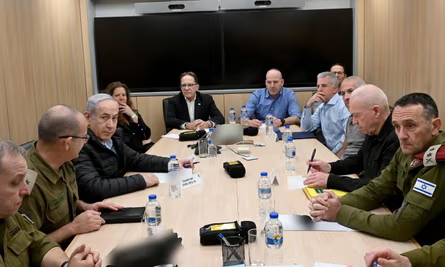Israeli Strikes
US President Joe Biden expressed hope on Saturday that Israel’s recent military strikes on Iran might signal the conclusion of a prolonged cycle of escalating tensions in the region. His administration is actively working to facilitate a ceasefire agreement for Gaza and Lebanon amid increasing hostilities. “I hope this is the end,” Biden told reporters, indicating a cautious optimism about the potential for de-escalation.
On the same day, Israel launched a series of coordinated attacks using fighter jets and drones, targeting military installations across Iran. This marked a significant development, as it was the first instance of Israel openly assaulting Iran after years of covert operations.
Despite the scale of the attacks, Iranian officials downplayed their impact, asserting that the strikes were minimal and ineffective. In contrast, Israeli opposition leader Yair Lapid criticized the government for not taking more decisive action, suggesting that the military could have inflicted greater damage.
The United States had previously warned Israel against targeting Iranian oil facilities or nuclear sites due to concerns over igniting a larger conflict. Instead, the recent Israeli strikes concentrated on air defense systems, radar installations, and facilities involved in long-range missile production. Reports from Iranian media indicated that the strikes resulted in the deaths of four soldiers.
Biden stated that Israel had informed him about the strikes beforehand and confirmed that their targets were exclusively military. His administration is keen to revive stalled negotiations for a ceasefire in Gaza, which have been overshadowed by ongoing violence between Iran and Israel.
In a carefully crafted response, Iran’s military suggested that it would prioritize reaching a peaceful resolution in Gaza and Lebanon rather than retaliating against Israel. This statement implies that segments of Iran’s leadership may seek to prevent further escalation. While Iran’s foreign ministry affirmed its right to self-defense following the strikes, it also acknowledged that certain radar sites had sustained damage but were already under repair.
Israeli military officials issued a warning to Iran, emphasizing that any aggressive response would necessitate a decisive reaction from Israel. “If the regime were to make the mistake of beginning a new round of escalation, we will be obligated to respond,” warned Israeli spokesperson Rear Admiral Daniel Hagari.
Calls for restraint came from various global leaders, including UN Secretary-General António Guterres, who expressed deep concern and urged all parties to avoid further military actions. The European Union, Russia, Arab Gulf nations, and G7 finance ministers echoed these sentiments, stressing the need for de-escalation.
However, months of similar appeals have largely failed to quell the rising tensions, as hardliners in both Israel and Iran advocate for more aggressive strategies, significantly heightening the risk of miscalculations.
Some Israeli political figures perceive this moment as a unique opportunity to strike Iran, particularly given the perceived disarray among its allies and the impact of previous airstrikes on Iranian defenses.
National Security Minister Itamar Ben-Gvir characterized the recent attack as “an opening blow” and asserted that further strikes on Iran’s strategic assets should follow.This rhetoric intensifies fears in Tehran that Israel may adopt a strategy reminiscent of its campaign against Hezbollah in Lebanon, where increased airstrikes eventually led to a ground invasion.
Experts warn that Iran may feel compelled to pursue its nuclear ambitions in response to the perceived threat, with Ali Vaez from the Crisis Group highlighting the potential for Iran to escalate its nuclear program.
Amid these developments, Israel’s Prime Minister Benjamin Netanyahu has adopted a more cautious stance, mindful of Washington’s persistent warnings about the dangers of escalation. Israel relies on US missile systems to counter Iranian threats and has utilized American military resources in its conflicts in Gaza and Lebanon.
The direct conflict between Iran and Israel escalated in April, beginning with an Israeli strike on an Iranian diplomatic facility in Damascus, followed by Iranian drone and missile assaults on Israeli territory. The tit-for-tat exchanges have continued, with each side calibrating its attacks to avoid full-scale war, despite the high stakes involved.
As tensions simmer, the ongoing violence in Gaza has drawn international scrutiny. Biden’s diplomats are re-engaging in efforts to broker a ceasefire and secure a deal for the release of hostages held in Gaza, where Israeli forces are conducting a significant ground operation.
Reports indicate that these military actions have resulted in numerous civilian casualties and heightened humanitarian concerns.
As the situation evolves, the potential for a broader confrontation looms large, especially with the upcoming US presidential election, which could influence future US foreign policy toward Israel and Iran. The violence and instability in the region continue to pose a significant challenge to peace efforts, with dire implications for the populations affected by the ongoing conflict.


